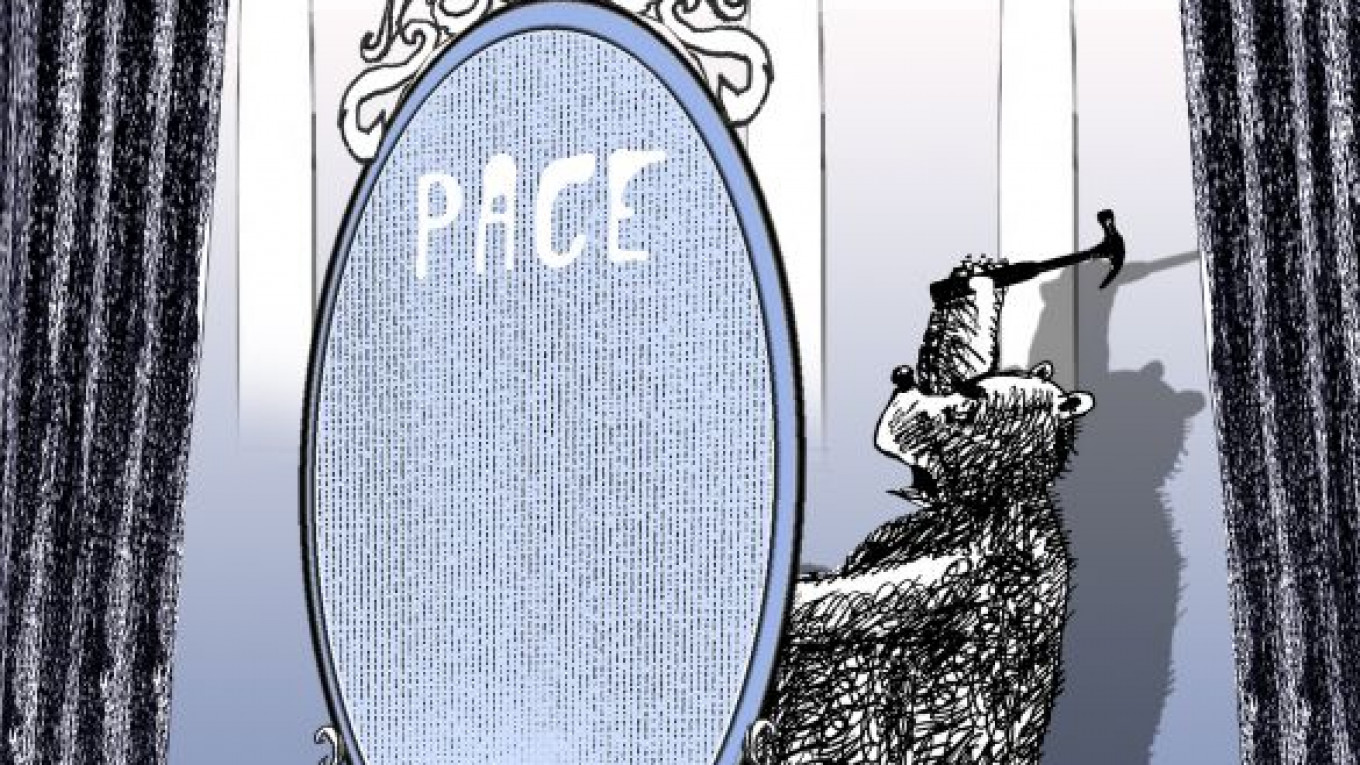Most of the 36 Russian lawmakers from the State Duma and the Federation Council who represent Russia in the Parliamentary Assembly of the Council of Europe, or PACE, are new in Strasbourg. They were selected in the spring after the December Duma elections.
During the PACE session this week, a memorandum with 550 points and a resolution with 60 points was discussed and approved. When I listened to some of my new Russian colleagues as they spoke about the report, it appeared that they did not fully understand the essence of PACE, their membership in this organization, the monitoring work or the European Convention for Human Rights itself. We can only overcome these difficulties by more discussion.
Duma Deputy Sergei Sobko from the Communist Party said PACE wants to push Russia out of Europe and that it seeks to enforce our values on Russians as U.S. President George W. Bush tried to do during his two terms in office. This is perhaps the biggest of all misunderstandings. By becoming a member of the Council of Europe in 1996, Russia subscribed to the values of the Council of Europe as elaborated in the European Convention for Human Rights. By joining, Russia decided that these are also the values that the Russian government wants to follow and guarantee for all of its citizens. Nobody wanted to impose anything on anybody.
We should never forget that these core values — democracy, human rights and the rule of law — are not things you can just buy, switch on or switch off. These principles are objects of an ongoing, never-ending collective learning process. No country will ever be perfect, but the more you learn and improve, the closer you will come to the realization of these values. Making matters more difficult is the fact that Russia has a 1,000-year history on its shoulders, and it is the largest country in the world, spanning seven time zones. In addition, post-Soviet Russia is little more than 20 years old. Taken together, all of these factors make the process extremely difficult.
But if there is no end in this effort, there can always be a beginning. The report of the PACE monitoring committee, which has stoked Russia's ire and is freely available on the Internet, simply tries to understand where Russia is in this process. More precisely, it proposes PACE's views to stimulate a mutual reflexion of where our organization stands and what we have to do to progress and speed up the process in the interest of all Russians.
Duma Deputy Sergei Kalashnikov from the Communist Party criticized the report for focusing so much on laws and conventions. But the law is not an aim in itself. The law has to be implemented in daily life. The same goes for the conventions and treaties that a country signs and ratifies. It's not enough to count the signatures at the end of a convention and then store them away in official archives. The real question is whether the articles in the conventions are observed by police, courts and the executive branch. We have the impression that many of the conventions Russia has signed are not being observed. This perception is mentioned to prompt Russia to try harder and do more to fulfill its obligations under these treaties. We are trying to help in this regard by engaging in intense dialogue with the Russian authorities and lawmakers. We want to hear the Russian side so we do not fall victim to untruths or false impressions.
One Russian delegate said PACE has a "strange notion of friendship" because we are critical of Russia. But friends are those who tell you upfront what you don't always want to hear. Those who speak kind words, who only tell you what you already know or what you want to hear, are not your friends. They do you a disservice by sugarcoating everything to please you.
Our critical approach is part of the empathy we feel for the Russian people. We care about them. That's why we have worked so hard on creating our reports, which we hope will serve as a handbook for Russian lawmakers, leaders and all Russians who want a democratic Russia and who want to strengthen the country's political and economic institutions. We are convinced that when Russian democracy is strengthened, the country's future is more assured, stable and that it serves the interests of all citizens.
Andreas Gross, a Swiss member of parliament, is the leader of the Social Democrats in the Parliamentary Assembly of the Council of Europe and serves as the council's co-rapporteur for Russia.
Related articles:
A Message from The Moscow Times:
Dear readers,
We are facing unprecedented challenges. Russia's Prosecutor General's Office has designated The Moscow Times as an "undesirable" organization, criminalizing our work and putting our staff at risk of prosecution. This follows our earlier unjust labeling as a "foreign agent."
These actions are direct attempts to silence independent journalism in Russia. The authorities claim our work "discredits the decisions of the Russian leadership." We see things differently: we strive to provide accurate, unbiased reporting on Russia.
We, the journalists of The Moscow Times, refuse to be silenced. But to continue our work, we need your help.
Your support, no matter how small, makes a world of difference. If you can, please support us monthly starting from just $2. It's quick to set up, and every contribution makes a significant impact.
By supporting The Moscow Times, you're defending open, independent journalism in the face of repression. Thank you for standing with us.
Remind me later.






